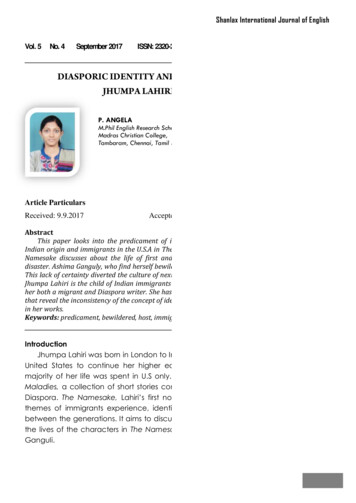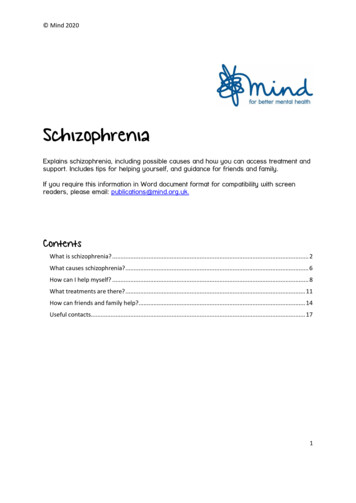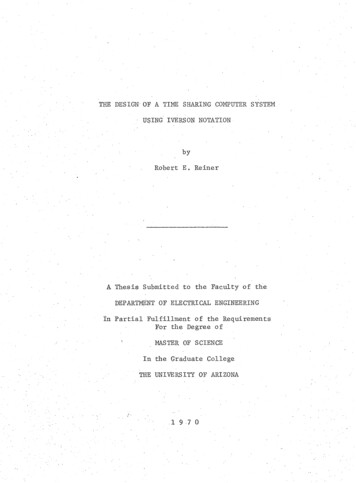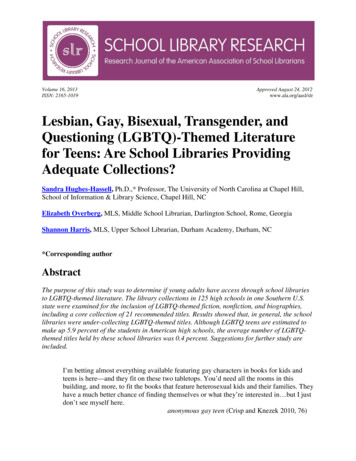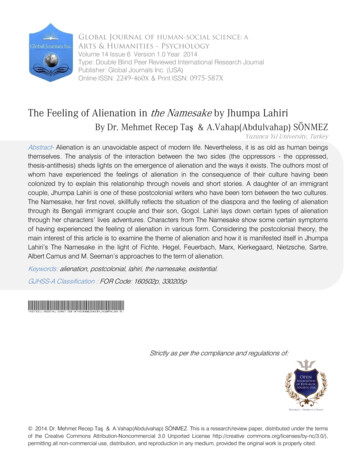
Transcription
Global Journal of HUMAN-SOCIAL SCIENCE: AArts & Humanities - PsychologyVolume 14 Issue 6 Version 1.0 Year 2014Type: Double Blind Peer Reviewed International Research JournalPublisher: Global Journals Inc. (USA)Online ISSN: 2249-460x & Print ISSN: 0975-587XThe Feeling of Alienation in the Namesake by Jhumpa LahiriBy Dr. Mehmet Recep Taş & A.Vahap(Abdulvahap) SÖNMEZYuzuncu Yıl University, TurkeyAbstract- Alienation is an unavoidable aspect of modern life. Nevertheless, it is as old as human beingsthemselves. The analysis of the interaction between the two sides (the oppressors - the oppressed,thesis-antithesis) sheds lights on the emergence of alienation and the ways it exists. The outhors most ofwhom have experienced the feelings of alienation in the consequence of their culture having beencolonized try to explain this relationship through novels and short stories. A daughter of an immigrantcouple, Jhumpa Lahiri is one of these postcolonial writers who have been torn between the two cultures.The Namesake, her first novel, skillfully reflects the situation of the diaspora and the feeling of alienationthrough its Bengali immigrant couple and their son, Gogol. Lahiri lays down certain types of alienationthrough her characters’ lives adventures. Characters from The Namesake show some certain symptomsof having experienced the feeling of alienation in various form. Considering the postcolonial theory, themain interest of this article is to examine the theme of alienation and how it is manifested itself in JhumpaLahiri’s The Namesake in the light of Fichte, Hegel, Feuerbach, Marx, Kierkegaard, Nietzsche, Sartre,Albert Camus and M. Seeman’s approaches to the term of alienation.Keywords: alienation, postcolonial, lahiri, the namesake, existential.GJHSS-A Classification : FOR Code: 160502p, ahiriStrictly as per the compliance and regulations of: 2014. Dr. Mehmet Recep Taş & A.Vahap(Abdulvahap) SÖNMEZ. This is a research/review paper, distributed under the termsof the Creative Commons Attribution-Noncommercial 3.0 Unported License http://creative commons.org/licenses/by-nc/3.0/),permitting all non-commercial use, distribution, and reproduction in any medium, provided the original work is properly cited.
The Feeling of Alienation in the Namesake byJhumpa LahiriKeywords: alienation, postcolonial, lahiri, the namesake,existential.BI.IntroductionAuthor α σ: PhD. Yüzüncü Yıl Üniversitesi Van/Turkey.e-mails: mehrectas@hotmail.com, abdulvahapsonmez@gmail.com 2014 Global Journals Inc. (US)Year19-orn in 1967 in London and raised in Rhode Island,Jhumpa Lahiri is an Indian-American author whowon the 2000 Pulitzer Prize for her short storycollection, Interpreter of Maladies. At an early age, shetasted the feelings of being dislocated, and experiencedthe feeling of being uprooted, a situation in which onefeels being torn into two rootless identities. In this regardshe utters ‘When I was growing up in Rhode Island inthe 1970s I felt neither Indian nor American’ (Atwan103104). When Lahiri was two years old, her parents whowere Indian immigrants moved to the USA. One caneasily claim that she experienced the duality andambivalence of the immigrant life of Indians as shebluntly says: “In spite of the first lesson of arithmetic,one plus one did not equal two but zero, my conflictingselves always concealing each other out”(Atwan 104).As she underlines, it is meaninglessness because shecould not make a choice between the two identities,which is an enormous motive for her postcolonialwritings. She was an Indian at home but when shestepped out of the threshold of the family zone, she hadto conceal her Indian identity. In fact, Jhumpa Lahiri’sboth short story books and her novel reflects herdiasporic experiences as a postmodern migrant living inthe USA. Therefore, her characters derive mostly fromthe real people around her, either in her past or present.What she does is to combine the India she has createdin her dreams with her experiences she has lived as animmigrant who looks forward to embracing her root. There-embracing of roots requires a philosophical journeybecause of the immigrant experiences of powerlessnessand meaninglessness, i.e. alienation. In this regardLahiri seems to have voyaged in such a journey as sheutters; “No country is my motherland. I always findmyself in exile in whichever country I travel to. That's whyI was always tempted to write something about thoseliving their lives in exile” (Oh, 157). The ‘those living theirlives in exile’ theme is stressed in her first novel, TheNamesake.The Namesake opens with the scene in whichAshima, a pregnant woman from Calcuta-India, tries tocook an Indian meal that dissatisfies her. This very firstscene reflects the total physical and psychologicalmood of migrants. Although she has the sameingredients to cook an Indian dish, she does notmanage to prepare as she did in India. The feeling ofdisplacement and alienation exist in all activities thecharacters carry out. She lives in a small and coldapartment and she is alone despite her pregnancy,which is an abnormal situation for the Indians. She ismarried to Ashoke Ganguli, who is an engineeringstudent at the Massachusetts Institute of Technology.Their families arranged their marriage and she moved tothe USA to live with her husband. She successfully borea boy. The baby is named after Nikolai Gogol, famousRussian author. Ashoke chooses Gogol as the pet namefor the newborn baby. Because Bengali culture requiresa baby to have two names; a pet name to be called byfamily and a good name to be called in the society.While Ganguli couples are about to leave the hospital,they are asked to write a legal name for the baby. Theyjust write Gogol on the birth certificate as an officialname for their boy with a hope that they will change laterwith a good name. The reason of Ashoke’s choosingGogol as a pet name for his baby is that he is indebtedto The Overcoat –a short story by Gogol- because in atrain accident the book saved his life. Gogol has noproblem with his name until he enrolls a kindergarten.Unaware of the fact that Gogol saved his father’s life, hechanges his name into Nikhil before he starts theGlobal Journal of Human Social Science ( A ) Volume XIV Issue VI Version IAbstract- Alienation is an unavoidable aspect of modern life.Nevertheless, it is as old as human beings themselves. Theanalysis of the interaction between the two sides (theoppressors - the oppressed, thesis-antithesis) sheds lights onthe emergence of alienation and the ways it exists. Theouthors most of whom have experienced the feelings ofalienation in the consequence of their culture having beencolonized try to explain this relationship through novels andshort stories. A daughter of an immigrant couple, JhumpaLahiri is one of these postcolonial writers who have been tornbetween the two cultures. The Namesake, her first novel,skillfully reflects the situation of the diaspora and the feeling ofalienation through its Bengali immigrant couple and their son,Gogol. Lahiri lays down certain types of alienation through hercharacters’ lives adventures. Characters from The Namesakeshow some certain symptoms of having experienced thefeeling of alienation in various form.Considering thepostcolonial theory, the main interest of this article is toexamine the theme of alienation and how it is manifested itselfin Jhumpa Lahiri’s The Namesake in the light of Fichte, Hegel,Feuerbach, Marx, Kierkegaard, Nietzsche, Sartre, AlbertCamus and M. Seeman’s approaches to the term of alienation.2014Dr . Mehmet Recep Taşα & A.Vahap(Abdulvahap) SÖNMEZ σ
Year2014The Feeling of Alienation in the Namesake by Jhumpa Lahiri-Global Journal of Human Social Science ( A ) Volume XIV Issue VI Version I20college life. An Indian Gogol shifts into an AmericanNikhil. The change in his name affects all his life style.Nikhil gives him an American way of life freedom thatdoes not exist and is not accepted in Bengali culture. Inthe end of the novel, we see that Gogol is alone again.Two different conclusions can be drawn from hissituation in the end of the novel: Either he manages toembrace both his past and present life in a more matureway and he comes a total or he is different from bothGogol and Nikhil.Human life has a vortex flow that developstranscendentally and keeps changing through itsadventurous voyage. Fichte best identifies this flow viahis triad, which states that a being/ an idea starts withthe proclamation of the thesis. Furthermore, thedeclaration requires the opposite of the thesis, i.e.antithesis. The crisis between thesis and antithesis istension that creates the most suitable (or sometimesdestructive) elements for improvement in human life.The outcome of this tension is synthesis that is theembracement of both thesis and antithesis but which isalso different from the both when each one is taken intoconsideration separately. Fichte’s triad is the formulationof this vortex flow as Jhumpa Lahiri in The Namesakehas pictured Gogol’s life.Gogol is the first child of Ganguli couple whoare immigrants from Bengali, India. The naming ofGogol, his ambivalence towards his culture, his strugglefor acceptance by his American friends, his duality insocial life (Indian and American), his choice of being anAmerican by depriving himself from his root and hisconfrontation with his reality are of crucial importanceand focal events as symptoms of Fichte’s triad inJhumpa Lahiri’s The Namesake.Gogol’s life has been studied by consideringboth the triad of Fichte and Hegel’s notion of alienation.Fichte’s thesis and antithesis have equaled to the firsttwo steps of Hegel’s philosophy (consciousness andself-consciousness) because they have illuminated thediversion of Gogol into Nikhil. The alienation of Gogol tohis Bengali identity by becoming Nikhil has beenevaluated in different ways because alienation in Fichteis different from Hegel’s notion of the term. For Fichte,alienation is an ongoing process and each stage(thesis-antithesis-synthesis) requires it. Moreover, forhim, the result of alienation is alienation again. On theother hand, Hegel comprehends alienation as a meansof negation to become oneself/authenticity. For Hegel,alienation is not an aim but it is a way to reach thereason.Another aspect that differentiates Hegel fromFichte regarding alienation in Gogol’s life is the results oftheir process of alienation. There is a unity of thesis andantithesis in Fichte. For him, the character that cameinto existence in the end of the novel is the combinationof both Gogol and Nikhil. But there is not such acombination in Hegel’s philosophy on alienation. The 2014 Global Journals Inc. (US)second stage in Hegel, negation, is just a stimulus forthe spirit and mind to take advantage from selfconsciousness’ experiences and become itself, be athome. When these two philosophies are considered,Jhumpa Lahiri implicitly depicts Gogol as both a newperson and a person who has gained his authenticity.Whether the person in the end of the novel is Gogol,Nikhil or both does not concern the theme of the article.The process of alienation is the focal point of this article.Besides, the end of novel is regarded as thecombination of Gogol and Nikhil for Fichte, and theGogol’s gaining his authenticity for Hegel to completethe process.The feeling of alienation that is experienced bythe characters of The Namesake cannot be confined tojust Hegel and Fichte’s notion of alienation. Thus, Gogoland Moushumi’s motives have been analyzed byconsidering existentialist alienation. Human conditionand existence precedes essence have been shown astwo crucial characteristic for Gogol and Moushumi’smotives. Gogol’s insistence on freedom of self-naming,choosing an appropriate way of life for himself and hissufferings as result of human condition. Moushumi’spersistence on her freedom and her explicit connectionwith France have been regarded as her existentialistmotives.In addition to philosophical approaches toalienation, Melvin Seeman’s scientific five-foldclassification of alienation has been used in theanalyzing of The Namesake. A character can be in manyvariants of alienation because of the contiguity. Thus,Ashima experiences “powerlessness” because of hersufferings during her pregnancy and the displacementof her Bengali values. Ashima is pregnant and at thehospital. There are not any acquaintances around,which is not an acceptable situation for Bengali culture.In Calcutta, when a woman is about to give birth, she istaken to her parents’ home, and her connection with herhusband her husband’s relations is cut until the baby isborn. However, Ashima is alone and lonely inCambridge; there is neither her relations nor Ashoke’s.Her experiences in hospital add to her view of life aboutAmerica. She thinks that she will never get accustomedto the lifestyle on this continent, a life totally differentfrom her life in India. In addition, she gives birth to ababy that she will bring up in this country where shedoes not have any relations to take advantage fromher/his experiences, expect Ashoke. One day sheexpresses her anxiety to her husband. “‘I am saying Idon’t want to raise Gogol alone in this country. It’s notright. I want to go back’ ” (Lahiri 33). Nevertheless, shehas to face the unbearable loneliness of this placedespite her unwillingness. For, she does not have thepower to divert the flow of her family’s life in this land.She experiences this feeling of powerlessness until shedecides to move to India after her husband’s death.
In India, there was not such a possibility for herto experience such an event and aftermath, to feel sodesperate. She suffers from knowing that the eventstaking place in this country is not in her power.Everything is challenging culture, life style, climate andthe relationship between people. Thus, she experiencespowerlessness because she cannot make sense of allthese. Ashima’s pregnancy is one of her unbearablesufferings that defines the limits of her ability to bear anydifficulty. Thus, she defines other sufferings byconnecting them to the pregnancy metaphorically.For being a foreigner, Ashima is beginning torealize, is a sort of lifelong pregnancy - a perpetualwait, a constant burden, a continuous feeling out ofsorts. It is an ongoing responsibility, a parenthesis inwhat had once been ordinary life, only to discover thatthat previous life had vanished, replaced bysomething more complicated and demanding (Lahiri49-50). feels lonely suddenly, horribly, permanentlyalone, and briefly, turned away from the mirror shesobs for her husband. She feels overwhelmed by thethought of the move she is about to take, to the citythat was once home and is now in own wayforeign.(Lahiri 278)In fact, Lahiri pictures the dramatic lifeadventures of immigrant people and meanwhile howthey feel all around the world. These immigrant peopleBut now that he's Nikhil it's easier to ignore hisparents, to tune out their concerns and pleas It is asNikhil, that first semester, that he grows a goatee,starts smoking Camel Lights at parties and whilewriting papers and before exams, discovers Brian Enoand Elvis Costello and Charlie Parker. It is as Nikhilthat he takes Metro-North into Manhattan oneweekend with Jonathan and gets himself a fake IDthat allows him to be served liquor in New Haven bars.It is as Nikhil that he loses his virginity at a party atEzra Stiles, with a girl wearing a plaid woolen skirt andcombat boots and mustard tights.(Lahiri 105)While he is taking up the American type of lifestyle enthusiastically, his other part, Gogol, pricks hisconscience. While he is at Maxine’s parents’ cottage inthe country consuming expensive wine and having fun,he suffers from a pang of conscience. “At times , andanother bottle of wine is opened, and Gogol raises hisglass to be filled yet again, he is conscious of the factthat his immersion in Maxine's family is a betrayal of hisown” (Lahiri 141). The meaninglessness of his life either 2014 Global Journals Inc. (US)21-Ashima has been tolerant to displacement andpregnancy in displacement despite her silent rebellionsthat never go beyond an idea. She is aware of the factthat Bengali identity is not equipped enough to wagewar against the displacement and the hegemonic valuesof the country. “Who had forsaken everything to come tothis country, to make a better life, only to die here?” isher another silent rebellion that passes through her mindwhen Ashoke is dead of a heart attack in a remote partof the country (Lahiri 180). After her husband’s death,AshimaYearShe stands there watching until the rear cardisappears into the tunnel, until she and Gogol are theonly people remaining on the platform. She pushesthe stroller back down Massachusetts Avenue,weeping freely, knowing that she can’t possibly affordto go back and buy it all again (Lahiri 42).are disappointed because they recognize that they donot gain anything despite their sufferings that has lastedfor many years.Before analyzing Gogol’s life in the light ss and meaninglessness should bepresented briefly. For Seeman, powerlessness is thedisability to control the events while meaninglessnesscan be summarized as the individual’s disability topredict the “behavioral outcomes” of the events ordisability to make a choice between two or morechoices. (Seeman 786) Thus, meaninglessness stemsfrom indecisions and senselessness, which is the mostprevailing characteristic of Gogol’s life. He has to sufferfrom being called Gogol until he changes his name intoNikhil but then he experiences the indecision betweenGogol and Nikhil. In addition, his dichotomy does nottake place just in names but it includes lifestyle, cultureand identity. At first, he does not want to be called byanother name when he is about to attend thekindergarten. Because “He is afraid to be Nikhil,someone he doesn't know. Who doesn't know him”(Lahiri 57). After he starts the school, he experiencesfirst insults about his name, and he afterwards decidesto change his name. Before he attends the university, hechanges his name into Nikhil. However, Nikhil is not justhis new name but it is the symbol for his new life.Therefore, Gogol experiences a dichotomy that takesplace between Gogol and Nikhil, Bengali and American.Nikhil brings a sense of self-confidence andself-esteem to Gogol’s life even for a short period oftime. He can easily communicate with girls and have funwith them. He ignores his family, smokes and loses hisvirginity, neither of which is acceptable for Bengalipeople.Global Journal of Human Social Science ( A ) Volume XIV Issue VI Version IAshima and Ashoke plan to visit their relatives inCalcutta in the following months. Ashima takes Gogoland goes shopping. Ashima buys presents for both herand Ashoke’s parents. While coming back from theshopping on the subway, she is late and takes Gogolout of subway clamp. Then someone from the crowdshouts to her, “your things.”(Lahiri 42) But the doors ofsubway clamp has already shut. She looks behind theirpresent bags in the rear car disappearing from the sighthelplessly.2014The Feeling of Alienation in the Namesake by Jhumpa Lahiri
Year2014The Feeling of Alienation in the Namesake by Jhumpa Lahiri-Global Journal of Human Social Science ( A ) Volume XIV Issue VI Version I22under the name Gogol or Nikhil is crystal-clear. Inaddition, he understands that the problem with his life isnot just a name even if it has haunted his life. Thesenselessness of not knowing the real precursor of hislife and the pangs of conscience deepen his disability tomake a choice between the two identities and makesense of his being as a Bengali immigrant couple’s son.In short, an “American-born confused Deshi”, Gogol is asymbol for the confusion that immigrants experienceunder the conditions of displacement (Lahiri 118).Normlessness and isolation are two the twoother kinds of alienation which Moushumi experiences. Itis not normal for Bengali people to express and discusssexual feelings with others. (Aziz) Ashima and Ashokerepresent this Bengali custom successfully and theymake an effort to instill this tradition into Gogol andSonia. In fact, the other immigrant families endeavor todo the same thing, too. However, two characters in TheNamesake, one is of Bengali descendent and the otheris Russian, Moushumi and Dimitri commit anindiscretion, cheating. Moushumi had an undesirablepuberty. Despite her need for love of the opposite sexespecially the white, no one was interested in her. “Theshameful truth was that she was not involved, was infact desperately lonely. She had rebuffed the Indian menshe wasn't interested in, and she had been forbidden asa teenager to date” (Lahiri 213). So she harboredinfatuations with her teachers and friends at school untilshe went to Paris for her education. Everything suddenlychanged there and she started to go out with men andgave permission to them to seduce her anywhere theywanted in a pub or at a park. Thus she gained her selfconfident.She seems to a perfect match for Gogolbecause she undergoes the same experiences: both ofthem are Indian, they both have artistic tastes; they bothhave suffered their foreign names. However, Moushumidoes not want to be engaged to a person for all her lifeand she “ wondered if it was her horror of beingmarried to someone she didn't love that had caused her,subconsciously, to shut herself off” (Lahiri 214). Inaddition to this feeling, one day she comes across thename Dimitri who she met when she was a teenagerand he was about thirty. “The name alone, when she'dfirst learned it, had been enough to seduce her. DimitriDesjardins” (Lahiri 256). Seeing this name, somethingreignites her years with him and she phones himalthough she is aware that she is married.Middle aged and an unemployed, Dimitri isliving in a dirty apartment. He is just the opposite ofGogol, which makes him attractive for Moushumi. Shedoes not like Gogol’s name, she thinks that Dimitri’sname reminds her of her days in Paris. Moushumiregularly visits Dimitri’s apartment and she cheats onGogol. Thus, Moushumi and Dimitri breaks a social rulewhich is valid in both Bengali and American society togratify their desires. Gratification of desires is not 2014 Global Journals Inc. (US)something wrong but the means they apply to gratify isunacceptable by the society. In addition, a marriedwoman’s quest for adventure in the arms of anotherman apart from her husband is an unwelcome act inboth Bengali and American cultures. Moushumi’smotives for isolation is not just a kind of anger orvengeance. Although she suffered from the conventionsof Bengali life style when she was a teenager, she doesnot try to devalue these conventions just because ofthis. The precursor of her rejection of Bengali valuesstems from her outlook on life she gained while she wasa student in Paris. Paris’s existentialist environment andpeople‘s interest in foreigners encouraged her toconstitute a modern world view of hers. Her outlook onlife contains characters of existentialist philosophy thatrejects any conventional thought and life style. Thus, shecannot do without her free life style, which makes her tobetray her husband, Gogol.Despite the fact that there are not explicit signsof Marx’s alienation, an implicit utterance has beenregarded as an evidence to add Feuerbach’s alienationto the analysis. Ashoke Ganguli and his parents’ beinggrateful to Nikolai Gogol instead of God has been takenas their denial of spirituality. According to Feuerbach,human beings can only overcome alienation by divertingthe flow of love and gratitude for God towards humanbeings. Ashoke does the same, and he is freer than theother characters.In The Namesake, although there are manyrituals, which are carried out by the Ganguli family, noneof these is religious but the rituals are Bengali customs.Thus, the Ganguli are not fundamentalists and even notreligious despite their dependency on India. Moreover,neither the Ganguli nor their relations are grateful to Godfor Ashoke’s survival from the train accident but instead,they chose to thank Nikolai Gogol, the author of “TheOvercoat”. he thanks his parents, and their parents,and the parents of their parents. He does not thankGod; he openly reveres Marx and quietly refusesreligion He cannot thank the book; the book hasperished, as he nearly did, in scattered pieces, in theearliest hours of an October day, in a field 209kilometers from Calcutta. Instead of thanking to God,he thanks Gogol, the Russian writer who had savedhis life (Lahiri 21).By doing so, Ashoke backs up Feuerbach onthe returning of love and thanks from God to humanbeings. He changes the object of human love from Godto human beings as Feuerbach says, “The task ofmodern era was realization and humanization of Godthe transformation and dissolution of theology intoanthropology” (Feuerbach 1). This is the end ofalienation in Feuerbach’s philosophy.Ashoke is the most comfortable individualamong Ganguli family’s members when his life in the
Just as desert travelers combine into greatcaravans from fear of robbers and wild beasts, so theindividuals of the contemporary generation are fearfulof existence, because it is God-forsaken; only in greatmasses do they dare to live, and they cluster togetheren masse in order to feel that they amount tosomething (qtd. in Sayers 12). 2014 Global Journals Inc. (US)Year23-Therefore, the modern man has lost his ability tolive his own life with his will and choice. He is a fallenwho looks for authenticity in a corrupted social life wherehe is being estranged from himself day by day as somecharacters in The Namesake.Bengali immigrants and the first-generation USborn children are exposed to the such postcolonialthemes of existentialism as freedom, subjective self,denial of traditional values, institutions and philosophy,and exercise of will and freedom. Freedom is the mostsensed theme of existentialism in the novel. Freedom ofwillpower is the protagonist’s focal quest throughout thenovel. Freedom to rename himself, freedom to chooseany culture, university, department; freedom to livewhere he wants are what Gogol wants consciously orunconsciously.Gogol’s life is haunted by his name. Being ason of an immigrant parent, he has already beenalienated in the hegemonic values and means of theAmerican culture. In addition, his peculiar name makesthe burden on his shoulders heavier. The weight of thename on his shoulders becomes so heavy that hecannot carry it anymore and looks for ways to get rid ofthis weight. He idealize that “ ‘There’s no such thing as aperfect name. I think that human beings should beallowed to name themselves when they turn eighteen,’he adds. This also proclaims the motto of existentialphilosophy that says existence precedes essence. “Toexistentialists, human beings-through their consciousness- create their own values and determine a meaningfor their life because, in the beginning, the human beingdoes not possess any inherent identity orvalue.”(Wikipedia) Thus, an individual can have thepossibility to constitute his/her identity according tohis/her essence. This notion ends the effects ofconventional values.For Gogol, existence precedes essencebecause he objects the traditional values of Bengaliculture and he, in many situations, makes choices thatare just the opposite of the values he is expected toobey. He loses his virginity, moves to another city to livealone, consumes much alcohol, ignores his family byrarely visiting and he changes his name that is the firstthing his family gave him. By becoming Nikhil, he thinkseverything in his life will be on the right track but contraryto his expectations, his loneliness and the sense ofisolation do not leave him in peace. He understands thefact that he cannot be at ease without gaining hisauthenticity. Therefore, instead of making reforms thataddress to the society, he sees the necessity ofchanges in his inner world that he has neglected foryears. Although his denial of Bengali values is anaspect of existentialist philosophy, regaining of thesevalues for the sake of authenticity can be an aspect ofexistentialism and deconstruction of hegemony, too.The way to the authentic self is through thedeconstruction of Nikhil and the quest for Gogol.Although it cannot be put forward that Gogol has gainedhis authenticity, he make an effort to be so. In fact, theresult is not important for a seeker the way he takesgives him the relief of being on the way towards himself.Maybe, this is the reason behind Gogol’s calmness inthe end of the novel.Moushumi is another character that experiencesexistentialist themes of freedom/freewill, denial ofconventional values and a quest for authenticity. She isespecially addicted to her freedom that gained in Paris.France is the country of two representatives ofexistentialist philosophy, Jean-Paul Sartre and AlbertCamus, where self-determination was gained via theFrench Revolution. Having been educated in Paris,Moushumi is a mixture of both Revolution andexistentialism on freedom. Although she is a member ofthe immigrant Bengali people, her life style andbehaviors are not confined to a specific culture. She isthe symbol of existentialist thoughts. In addition to herfree life style and her addiction to her freedom, she,meanwhile, is struggling to disconnect herself fromwhatever constitutes her Bengali identity. Bengali valueshinder her from achieving whatever she believes to beher essence. Her regular visits to Mimitri’s apartmentand thus her betrayal to Gogol are the results of thestruggle for keeping her freedom and does not lose theGlobal Journal of Human Social Science ( A ) Volume XIV Issue VI Version IUSA is taken into consideration. Ashima suffers fromdisplacement. Gogol is isolated and estranged. Sonia,who prefers materialistic satisfactoriness, is as reservedas his father. The difference between Gogol-Ashima andAshoke-Sonia s
Keywords: alienation, postcolonial, lahiri, the namesake, existential. I. Introduction orn in 1967 in London and raised in Rhode Island, Jhumpa Lahiri is an Indian-American author who won the 2000 Pulitzer Prize for her short story collection, Interpreter of Maladies. At an early age, she


